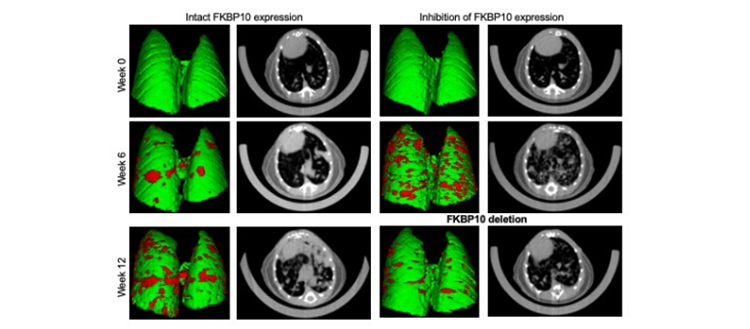A novel molecular target for particularly aggressive cancers
By deciphering how the FKBP10 protein facilitates lung cancer progression, UNIGE scientists are proposing an original therapeutic strategy.

Three-dimensional lung (green) and tumors (red) and corresponding X-ray scans (black and white) at weeks 0, 6, and 12 after tumour onset (left: mouse with intact FKBP10; right: mouse with inhibition of FKBP10). At week 12, tumour growth is greatly reduced upon FKBP10 deletion. ©UNIGE Coppari/Collart labs
Relevance, specificity and limitation of the risks of relapse: these three elements are essential when developing new cancer therapies. By deciphering the role of a protein called FKBP10, expressed in tumour cells of certain cancers (e.g. lung and colon cancers) but not in healthy cells, scientists from the University of Geneva (UNIGE), Switzerland, identify an innovative therapeutic target. Indeed, this particularly harmful protein seems to increase the aggressiveness of the cancer by promoting cancer-stem cells that are extremely resistant. By inhibiting this protein in an animal model of lung cancer, the Geneva team has succeeded in regressing the tumour in a spectacular manner. These results, that can be read in the journal Cell Reports, provide a first proof of the interest of FKBP10 in certain forms of cancer with a poor prognosis.
Cancer treatments often kill both healthy and diseased cells, triggering devastating side effects. In addition, some cancers, which at first appear to be reduced in size after a series of treatments, reappear in an even more aggressive form, an effect suggested to be driven by cancer stem cells. Improving accuracy and limiting the risk of disease recurrence are therefore two of the main objectives of research when developing any new therapy.
In 2014, Roberto Coppari, Professor in the Department of Cell Physiology and Metabolism at UNIGE Faculty of Medicine, identified a protein, called FKBP10, which is expressed in human lung cancer cells but not in healthy cells. “This protein appears to be important for rapidly dividing cells, and must therefore be expressed during embryonic development and in the early stages of life, when the developing organism must build up quickly”, explains the scientist. “Its expression is then greatly reduced (if not completely shut down) in adulthood, but can be reactivated selectively in tumour cells.” In addition, the presence of FKBP10 seems to herald bad news: these tumours are more aggressive and the patient’s chances of survival are reduced.
Inhibiting FKBP10 to avoid the risk of relapse
To test the role of FKBP10 in cancer progression, the researchers studied a mouse model of lung cancer. “The inhibition of FKBP10 expression in some of our mice, particularly after tumour development, led to the near disappearance of cancer”, says Coppari. “This confirms, in a whole organism, the results we had previously obtained with human cancer cells. It also shows, and this is really important from a therapeutic point of view, that the process can be reversed after cancer onset.”
Furthermore, FKBP10 also appears to be involved in the high risk of relapse: a few months or years after an initial apparently effective treatment, the tumour may return very aggressively. “Resistance comes from so-called “cancer stem cells” that have a very specific profile”, says Martine Collart, Professor in the Department of Microbiology and Molecular Medicine at UNIGE Faculty of Medicine, whose expertise in protein synthesis and assembly has proved essential. “Treatments generally aim at destroying rapidly dividing cells, as are most tumour cells. However, cancer stem cells can escape because they do not divide rapidly. They can be even selected and enriched by chemotherapies before becoming capable of proliferating, and then induce relapse in an even more aggressive form. In this context, FKBP10 appears to be important for protein synthesis and particularly upon insertion of an amino acid called proline. Hence, by inhibiting FKBP10 we not only arrested proliferation of cancer cells but also hindered the formation of cancer stem cells.”
Indeed, in order to be able to assume their function in cells, proteins must fold correctly after synthesis. This phenomenon is linked to the way in which the amino acids are arranged. One of them, proline, can adopt different configurations, and thus allow proper folding and function of proteins in which it is incorporated, or not. And FKBP10 changes the isomerisation of proline – the way it is configured – in proteins.
Two complementary approaches for a new therapy
While not all tumours express FKBP10, this protein does appear in a good number of them, particularly those affecting lungs, colon or breasts. In the course of their work, the Geneva teams have adopted two different but complementary approaches: Roberto Coppari is in the process of reanalysing dozens of drugs already approved in order to test their effect on FKBP10, in the hope of identifying an effective inhibitory molecule. Martine Collart, for her part, is working on the exact characterization of the protein to target it specifically. “We are addressing the same issue in a different way in order to combine them for greater efficacy”, the authors conclude.
This work has been made possible thanks to the support of the Swiss National Science Foundation (SNSF), the Geneva Cancer League and the Swiss Cancer League, among others.
